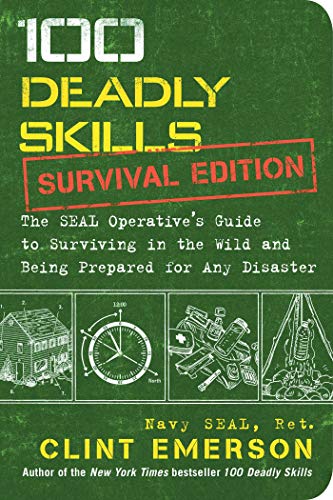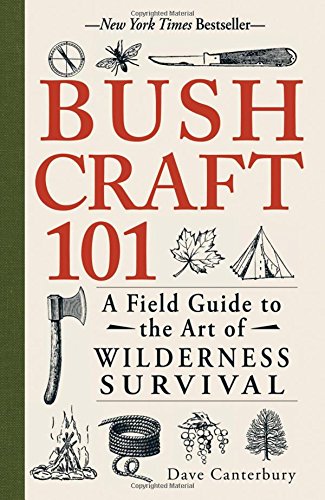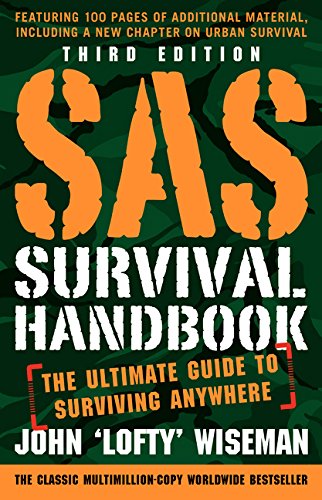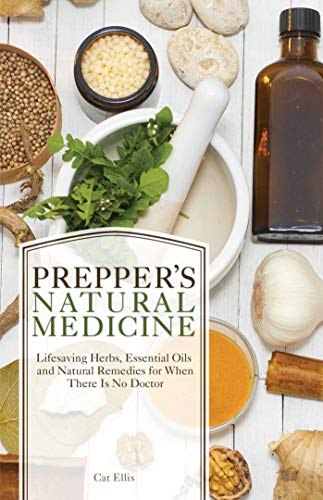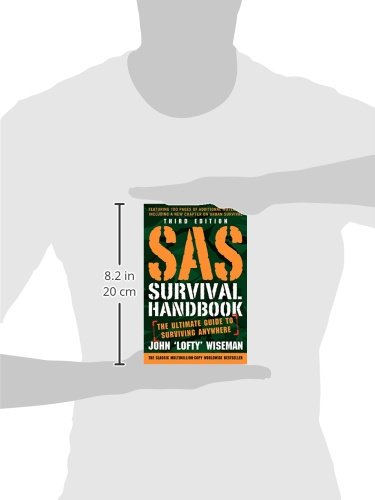Even with all of the training in the world, you might not ever feel prepared for an emergency when it happens. However, with our pick of the best survival books, you can at least be equipped with the relevant knowledge should you ever find yourself in a survival situation. While online resources are a blessing in the digital age, sometimes nothing can compare to the substance and detail of a physical book. Simply owning a survival guide won’t solve all of your problems, though. You must study them and try to put their advice into practice whenever you can, in order to enhance your survival skills and feel ready for when disaster strikes. With such a vast selection of books to choose from, however, it can be overwhelming to decide on the best ones for you. That’s why we’ve narrowed it down to five of the best survival books, to give you the clearest insight into what to choose. There are all sorts of situations where the advice from these books will come in handy, such as surviving in the wilderness or areas without shelter. Hopefully, you are never in such a situation, but if so, survival books can be a great resource to give you the advice that you need.
Prepper's Long Term Survival Guide
As this book focuses on long term survival skills, it is less concerned with wilderness and bushcraft advice. Interestingly, Jim Cobb specifically explores the long-term effects of large-scale disasters and disaster survival, such as a lack of electricity or gas, or a water shortage.
This makes it a unique take on the survival book and would be particularly useful for readers who are fearful of natural disasters and emergencies. However, Cobb is not just looking at earthquakes or short-term emergencies that, if adequately prepared, a town can typically cope with in this day and age. Instead, Cobb also advises on global pandemic and failure of power grids.
His advice on urban issues such as power failure makes it a suitable guide for those living in suburban or urban areas, as opposed to just being aimed at rural citizens. This is useful, as those living in towns and cities are typically less prepared for emergencies than those used to the wilderness and survival basics.
It is also a relatively short read, which means, despite how overwhelming this kind of information can seem, the smaller book makes information easier to digest.
It is worth noting that some readers have found that although Cobb writes a lot of common-sense advice, he does not go into enough extensive detail to fully prepare someone for long term survival. Larger disasters would inevitably need more preparation and, therefore, more detailed advice, so this may be an issue if you are looking for the most in-depth and comprehensive guide.
Read the full post_title; ?> review
Pros
- Useful for people living in towns and cities
- Advice for long-term survival
- A short read so does not overcomplicate ideas
Cons
- Not enough detail to feel fully prepared
100 Deadly Skills Survival Edition
100 Deadly Skills: Survival Edition is one of the most comprehensive survival books on the market.
As the title states, he teaches you 100 skills in an in-depth field guide, which draws from real-life civilian experiences. The guide itself combines tried and tested survival tactics with the use of easy to access tools that should be available to you even in difficult situations.
Emerson uses specific scenarios to help you understand the best way to utilize the survival hacks, helping you to prepare for almost any disaster situation. These situations include even the most seemingly bizarre scenarios, such as being forced to land a plane or fighting a bear.
It is an overall fun read, despite covering scary situations, as it is not too complex. This makes it a good option for younger readers as well (although some situations may be too frightening for them to handle, so bear this in mind).
There are also clear and detailed illustrations for each skill. Not only can they help to improve your understanding, but you can also use them for easy access should you really be stuck in an emergency.
While it is an easy read, depending on your approach to learning survival tactics, you may find that some of the information here isn’t useful to you. As it covers topics that you may not ever encounter and are quite far-fetched, it is worth bearing in mind how practical the advice really is when looking for a survival manual.
Read the full post_title; ?> review
Pros
- Explores a variety of survival situations
- Clear illustrations next to each skill
- Uses real-life experience to advise you
- Looks at unusual scenarios
- Written by ex special forces Navy SEAL, Clint Emerson
Cons
- Some of the skills are only applicable to more far-fetched scenarios
Bushcraft 101: Field Wilderness Survival
This survival guide is designed to prepare you for any time in which you need to survive outdoors. It covers a range of survival skills you’ll need, such as manufacturing tools and protecting yourself from harsh weather.
It focuses on wilderness survival, so don’t expect much talk of how to prepare for terrorist attacks or global emergencies in this survival guide. However, this means there is a lot of detail on bushcraft, which is helpful if you are completely new to the world of survival and need to strengthen your basic survival skills.
You can also take comfort in the fact that the author, Dave Canterbury, is the co-owner and a survival instructor at the Pathfinder School, one of the Top 12 Survival Schools in the USA.
Although there is a focus on wilderness skills, some readers have found that the information is almost too common-sense. At times, there is more of a focus on the science and history behind the techniques, rather than how to perform the techniques themselves.
It is also worth considering that there is arguably a lack of illustrations in this book, which might hinder you if you like to absorb information visually.
Read the full post_title; ?> review
Pros
- Easy to follow advice
- Written by top survival instructor
- Useful for learning basic wilderness skills
Cons
- Lack of illustrations
- Information can seem over-simplified at times
SAS Survival Handbook, Third Edition
John Lofty Wiseman has authored this bestselling survival guide that covers a wide range of survival scenarios, and now, in its third edition, also contains information around terrorism and urban-based disaster survival. As Wiseman is an ex Special Forces survival expert, his advice has a trustworthy backing and can be taken as a reliable source from a survival instructor.
This book covers far more than just wilderness survival, making it a useful guide to have in today’s unpredictable world. It also looks at advice around fear management, and how to mentally cope with emergencies, which is essential knowledge for all survivalists and preppers to be aware of.
It also contains useful tips for surviving various climates and geographical areas, rather than only providing ‘one-size-fits-all’ advice. Wiseman’s exploration of all kinds of survival situations makes his book a perfect choice for both beginners with basic survival knowledge to more advanced survivalists.
Some readers have noted, however, that because of its wide topic selection, the advice per section can feel too broad, and doesn’t go into enough specific detail.
Read the full post_title; ?> review
Pros
- Budget-friendly
- Explores a wide range of survival skills
- Suitable for beginners and advanced survivalists
Cons
- Advice may be too broad and generalized, as the book covers a lot of survival topics
- Not available for Kindle, Audiobook or Audio CD
Prepper's Natural Medicine
While natural medicine is not without its skeptics, during times of crises, it can be a matter of life-or-death for you and your family, as Cat Ellis shows in this useful guidebook.
If you unfortunately end up in a situation without access to doctors or hospitals, this book gives you clear advice on how to create the best home remedies to cure you, or even save your life. These include remedies for infections, poison ivy, burns, flu, and even broken bones.
Ellis describes these techniques with easy-to-read herbal charts and a clear explanation of the various essential oils. There are step-by-step instructions on how to create your own salves and elixirs, which is incredibly beneficial, especially if you are entirely new to the world of natural medicine.
Despite being clear and concise, the book is comprehensive and practical. It gives you detailed instructions on not only what ingredients to use and how to prepare them, for example, but also the appropriate dosage you will need.
Although there is a lot of detail, it is the shortest out of our five books, and is relatively lightweight. It would, therefore, make a great option to take in your backpack when you venture into the outdoors.
One issue that some readers have mentioned is that the book fails to acknowledge a more drastic situation where you would be completely unable to grow certain herbs or make your own ointments. Depending on the level of survival you are focusing on, it is worth considering whether this approach to natural medicine would be useful to you.
Read the full post_title; ?> review
Pros
- Easy-to-read herbal charts
- Step-by-step instructions throughout
- Explains remedies for a variety of issues
Cons
- Not very useful for more drastic survival situations that will have long-term effects (i.e., no ability to grow herbs or access to health stores)
Experience Level
When choosing the best survival book for you, it is essential to consider your own experience level regarding the outdoors. Whether you’re a complete novice when it comes to survival tactics, or you’re a seasoned survival expert, there will be a suitable book available for you. As some books are targeted more at beginners, if you are just starting out on your prepping journey, you will need to choose the appropriate literature to help you. Be sure to review the book’s description and its contents to double-check that it will be useful for you and relevant to your physical ability level. Determining your level of experience means being honest with yourself about your practical skill level. Although you may be a keen backpacker with lots of experience in the outdoors, this does not necessarily mean your bushcraft skills are the sharpest. Having experience with outdoor activities may mean that you’re more aware of basic survival skills, but it is not the same as being forced to live off-the-grid or without shelter.
Areas of Interest and Concern
As there are many specific areas of survival, consider what interests you the most and let that be your starting point. Some books focus mainly on shelter building and gathering food, while other books will advise you on wilderness medicine, for example, so having an area of interest will help to narrow down your selection. If you are struggling to find a particular point of interest, then think about scenarios that concern you the most. Are you terrified about being without food? Or maybe you’ve recently watched a disaster movie, and now you’re scared about unexpected weather emergencies. You will feel far less fearful of these situations once you learn how to face them, so use your fears to your advantage before it’s too late! Another factor to consider is the area in which you live and its particular climate, as this can be an area of concern. If there is a higher chance of being faced with a disaster scenario, you will need to develop specific skills to deal with it. For example, if you live in a state that is on or around fault lines, there is an increased risk of an earthquake, so books focusing on this can help to put your mind at ease.
Patience
Upon reading survival books, you may feel like you are bursting with knowledge and expertise, ready to handle whatever disaster the world throws at you. As exciting as it is to want to get out there and live off the grid, always remember that perfecting your survival skills will take a lot of time and patience. A lot of your practice will feel like trial and error scenarios, but this will help you to eventually master techniques such as shelter building and making fires. Use survival books to guide you and give you substantial advice, but remember that putting this advice into practice is a lot different from reading it. Take your time to absorb all of the information and gather the relevant equipment before diving headfirst into a mock disaster situation.
Practical Training
Undoubtedly, the best way to learn how to survive in the wild is by applying your knowledge in real situations. Of course, you have to build up your knowledge somehow, and books are incredibly useful for this. They often contain more in-depth information than online videos or articles, and they will typically be well-researched. The best way to start practicing is just to get out into the wilderness, but you can even practice skills such as fire starting in your own backyard. Books give you a strong starting point, but using your imagination rather than your hands to practice will only get you so far.
Going Above the Basics
You may find that a lot of the best survival books cover similar topics, and most of them will include information on basic survival skills. For beginners, it’s great to build up your knowledge of the basics before you venture into more complicated territory. However, you may find that you consume so much information around things simple survival tactics, without delving deeper into more complex scenarios. In this case, you should consider choosing a more advanced-level book. There will be a considerable amount of overlap amongst even the most sophisticated books, but this shouldn’t prevent you from wanting to expand your knowledge and gather information from a wide variety of sources.
Recap
Although planning for your survival is going to require more than reading the best survival books, it can be helpful to have accessible resources on hand, and even more helpful should you be in a situation without internet (which is very likely)! With that in mind, I have chosen Clint Emerson’s 100 Deadly Skills: Survival Edition: The SEAL Operative’s Guide to Surviving in the Wild and Being Prepared for Any Disaster as my favorite field guide and non-fiction survival book. This survival manual contains the clearest and most concise information, straight from an ex navy SEAL, while still being an engaging and enjoyable read. It makes it an excellent choice for beginners who are starting out in their survivalist journey, as it does not over-complicate the tactics or techniques. It is also the winner here due to its use of illustrations. With a clear illustration next to each skill, it gives the reader the best possible depiction of how to implement a skill or technique in the real world, so it is a safe option to take with you everywhere you go. The use of illustration also makes the book more inclusive, making it suitable for younger readers as well as those who struggle with their reading. You never know when those illustrations will come in handy! If you are passionate about your survival and truly want to develop your skills, then I would certainly recommend having the best survival books on your shelf. While fiction survival books can inspire you to get involved in wilderness survival and prepping, the best non-fiction survival books, including the ones we have reviewed for you, should encourage you to develop your knowledge and increase your preparation. I hope these survival manual recommendations are useful for you, and please comment below if you have any more survival book suggestions. We are always seeking to be the ultimate survival platform for preppers and survivalists and welcome any ideas, so let us know if there are any particular topics you would like us to cover in the future. Good luck and happy survival prepping!
Share the Love
If you found this post useful, please let others know about it by sharing it.



